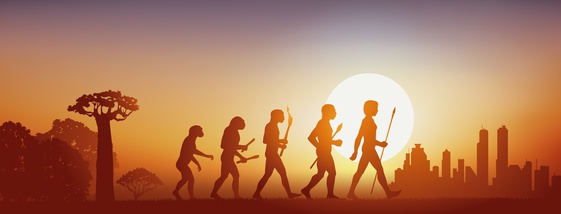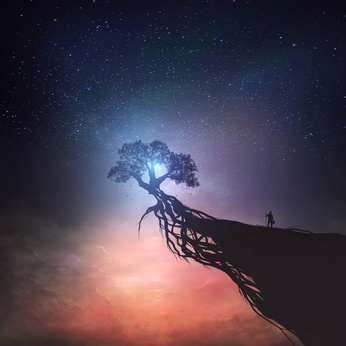Where is evolution heading? Where is forward and what it could be next evolutionary step? Could it be predicted?

I wish it would be as simple as it is in mathematics to define a line, by placing two dots, then connecting them. Then, the direction of the line would be established.
What if there are two dots we could connect, to create that line, that would show the “line of evolution”?
Some people say a breakthrough could be expected in biogenetics. Researching the brain is still in progress. Where will we evolve? Why do we have such a significant brain capacity, and why don’t we use it all?
“The story of life on Earth is written in the rocks. True, this is a history book torn and twisted, with remnants of pages scattered about, but it is there, and significant portions are still legible.”
Jerry A. Coyne
Our first history book is in the fossils; isn’t that amazing? We tend to put significant importance on our written history of 5000 years, but the history of humankind alone goes back as far as 300 thousand years. There is a mark about 70 thousand years ago when was a “cognitive revolution”, and we started to use our brain power more efficiently. From around this time evidence has been found for the first symbolic art.
Let me shock you further: scientists have calculated that Earth is 4.54 thousand million/billion/ years old, with an error range of 50 million years.
These numbers are not just showing us how much we don’t know, but also suggest one of the main factors of evolution, Time. Today the predicted life expectancy is about 85 years. A lifetime of a human being is a very tiny mark in terms evolutionary changes.
Evolution has a few major factors:
The first one is the fact of a common ancestor; it allows us to categorise and organise lifeforms, with similar features.
All lifeforms that have a backbone, called vertebrates, descended from a common ancestor: fish, amphibians, reptiles, mammals… – one of our common ancestors is the fish :). The embryo through its development looks like it goes through evolution! The fish-embryo is very similar to the embryo of all the vertebrates; including to humans.
Fish Salamander Tortoise Chicken Rabbit Human
Gradualism: It takes generation after generation to reach a broader noticeable change. This means thousands of years.
Speciation: When changes occur and develop so far that no more “interbreeding” is possible. It means splitting into two species.
Survival instincts, adaptation to new sudden chages:
All creatures have a strong survival instinct, to help prevent them from dying too soon. It is intended to help to get out of life-threatening situations. If we are hungry, we search for food. Life is depending on life. Part of our survival instinct is to find food and stay alive. As the humankind learned agriculture, and how to farm, then we built cities, towns, the survival instinct fall into the background.
The law of the jungle that only the strong survive is not necessarily always valid. The dinosaurs were wiped out by some mystery, or climate change, or bad luck/minions, despite being robust and powerful. Sudden changes could cause new evolutionary steps which result in better adaption to the new situations.
As a human race, we rule over the animal kingdom, and we use the land to feed us. We are already the ‘strongest’ species on the planet. We should protect, and look after what we rose above rather than just exploit it. We can adapt to a vast variety of conditions, unless we are bringing about for ourselves some irreversible catastrophe; like drowning in plastic.
We see that through natural selection everything gets refined, more sophisticated, and more efficient. But evolution still leaves its mark on us; we all have a tailbone, or an appendix, which has no use for us but is still there. There are a few animals, plants that have remained as they were for long, long time; but us humans, we have changed a lot. We developed our thinking mind, which allowed us to create. As soon as that happened, we started to create our own world, our language, our belongings, nationality, identity, and a social world. Today we enjoy the fruits of that.
Could we know what is the direction, or what is ahead?
We learned medicine, and we found cures for many diseases. The chance of an accidental mutation is small, and is more likely to be corrected by surgery or at least we would attempt to fix it. As a matter of fact we research genetics, we clone, and we hack embryos. We continuously try to improve on nature, and we might try to ‘build’ our superior human. Any mutation that would happen would be very slow, and could be only seen after hundreds if not thousands of years. It seems that we take control into our own hands.

But there is one thing we can notice from human history. Yuval Noah Harari, author of Sapiens, points out that there is a direction. That direction is unification. Through our history, we tend to move from small isolated groups to the greater one, and to one single global culture. From the first small groups of 10-15 to a 100 or 150 people, then to nations, cultures, and ultimately humankind. It could be only seen if we look at thousands of years together. What does this mean?
Once there were entirely separate human worlds like that of the Aztec or Inca empires, North America, or Tasmania. They developed independently in isolation without knowing each other at all.
Today the whole world is joined together! It is not homogeneous, but we are all connected, and we influence each another in myriad ways.
It means that we are incredibly powerful in unity. If we look back thousands of years, we realise that we are branches of the same tree; and rather than trying to dominate, we need to embrace that fact. We need to honour and care for our culture but not letting it separate us.
We need to study and learn languages, cultures, and religions to help us unify rather than divide. What is the 3,000 year history of a nation comapared to 70 thousand years of the history of humans? The continents move about an inch every year. Borders are only ideas, no matter how many walls we will build. Everything is in a constant course of change and movement. People will mix, travel, explore, and unite. Luckily we have the internet, and we have devices that can connect us. Is that not unity?
If we go back to mathematics and defining the ‘line of evolution’, this is where the first dot could be placed.

However, there is another factor that is at the root of evolution. That is reproduction. We are female and male. Having this polarity nature give a wide range of possibility to natural selection. Variations and the mix of genes allow us to combine and bring forward new adaptations. We are attracted to each other to bring children to this world. We are blessed with a great sense of pleasure when we are making love.
Let’s just think for a moment, why is this pleasure encoded in everyone?
Could be that: Nature wants us to have children, and that we secure the future by giving life to the next generation; and so rewards us with great pleasure when we fulfil this duty?
Could this mean that everyone’s duty is to keep life going forward? Isn’t it our strongest connection to our family, or our children?
We can recognise that each of us has a service to do. Yes, it could be interpreted as having kids; but. more importantly, it could be raised to a higher level without overpopulating the Earth.
Let me explain: If nature rewards us with a great sense of pleasure when we try to make babies, it means it wants us to have children. If we have children, then evolution goes forward. Therefore it wants us to help evolution keep going, to continue. Could we support evolution without having kids? The answer is yes: if we help humankind. If we decide to serve humanity, we are helping evolution at a higher level.
We have a reasoning mind and a loving heart so we can transform “sexuality to service of mankind”; even more so if we recognize and transform our daily job to a “service for evolution”.
Is not service by other name giving? Is not giving the best thing you can ever do? Isn’t it a big pleasure as well?
It can go even further. By putting our selfish needs aside, we can align ourselves with a higher purpose. We can be whoever we want to be as an individual, and we could find our meaning in service to humankind.
Wouldn’t it be better if we filter our job by not just how much it pays, but how much we love to do it, and how much it serves humankind?
In spiritual terms, the self as an ego always has been the subject of detachment from it. Is not our definition of a hero who is putting his selfish needs behind for the importance of the greater good.
Now, this leads us to spirituality, or to the path to self-realisation. The second dot for the evolution’s directional line would be here. Why?
Because if we look at “self-realisation” and its core, we could see that is leading from the one to the unity. The individual who realises himself as a non-dual being has achieved oneness.

As a conclusion, if we look into evolution in a large scale we can see that it is maybe speeding up and it goes toward unification; and so it does in the individual level as well. But more importantly, we can choose to go towards unity; we can seek self-realisation, we can nourish and maintain our culture and embrace the ‘big tree’ that we are together. We can train and use our brain to push beyond the limits; it still has lots of potential. We can learn, educate ourselves, and we can step on a spiritual journey. We can practice meditation. We can define ourself in unity, and still being unique and genetically different. It might be that we don’t have to wait until some breakthrough in biogenetics, and might not need to craft super-humans. Maybe we can just simply look inwards, master our mind, and unite as one.
Recommended readings:

